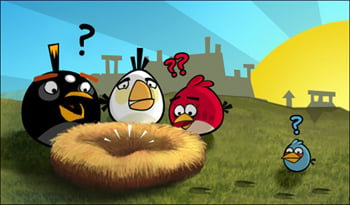Blog
e-Learning Course Text: Less is More
by Mary-Scott Hunter, vice president - client services


Angry Bird's Implications for m-Learning
By Allen Interactions | March 07, 2012 | Custom Learning | 0 Comments

by Mary-Scott Hunter, vice president - client services
You probably already know that the current favorite rags-to-application-riches story is Angry Birds. Conceived during the swine-flu panic in 2008, the game developer Rovio Mobile created a simple game with an equally simple premise: pigs stole our eggs. We want revenge.
By 2010, it was the number one best selling app. In MIT Entrepreneurship Review (February 2011), they called Angry Birds "the largest mobile app success the world has seen so far."
Those who want their companies to invest in m-learning might read that and salivate.
After all, Angry Birds boasts the triple crown of user nirvana: 1) behaviorally-based, 2) simple, elegant interface, and 3) a game that takes six minutes to complete, manages to draw users back for eight, nine, ten hours. Those who create learning events cry out the same outraged chorus: why can't we create learning like that?
Behavioral-based
The problem with m-learning right now is that everyone wants Angry Bird success without paying attention to those three success factors outlined above. The secret to mobile learning success isn't much of a secret. Dr. Michael Allen discusses it in every book he writes. My team and I preach it at every project kick-off. If you want learners to value your training, first and foremost, it's got to be behaviorally-based. Your learning event must center around actions performed by users, not content.
Everyone reading this will nod at that sentence and it sure looks like agreement, but then Carol from Legal wants this text explained in detail, so suddenly that's included. Just a small compromise. Then, the Regulatory team doesn’t like the idea of putting learners at risk, so we'll just compromise a bit more and put in some reading pages here, here, and here. You must understand that successful m-learning will not tolerate content-heavy, reading-rich applications.
How many screens are learners required to read about physics and calculating angles for hurtling birds at the pig lair? None.
Simple, elegant interface
Ask yourself these questions:
- Are you willing to create a simple interface that focuses on learners? (Everyone's nodding again.) Uh huh.
- Are you willing to remove your own company logo to make sure the interface is simple? (Less nodding.)
- Are you willing to whittle away content that is not absolutely essential to the next step? (Infrequent, hesitant nodding.)
What if your CEO says, "it's not intuitive; I couldn't figure out what to do next" but your learners had no problem. Would you risk arguing against the CEO's changes on behalf of the learners? (Crickets.)
The gaming industry gets who their customers are: the ones who pay for their product. We in the training world say the learning is for learners, but when push comes to shove, is it? We don't like their suggestions so we don't include them. Yet for widespread acceptance of a learning event, the usability testing with actual learners must drive decision-making.
If the first success factor isn't heeded (behaviorally-based), then the second success factor (interface) cannot possibly succeed and you get an application that is designed to hold content. And beyond a smartphone's contact list, users are underwhelmed by the prospect of reading extensively in the palm of their hand.
Time to complete
As a gamer, I am willing to spend several hours a stretch in an immersive world that fascinates me (Skyrim or Flower). I return over and over for the richness, to see what nuances I might discover during each visit. I play mobile games as well, 15 minutes here, an hour on a plane there. However, meaningful and memorable experiences are more likely to happen on a PC or console device. While the technical limitations of delivering on mobile have quickly evaporated; on a handheld device, I’m still mainly passing time.
In contemplating m-learning's golden possibilities, some fixate on its many advantages without considering what could be lost. Learners might not invest much affect in an m-learning experience. If you're developing higher-order skills that require learner richness or complexity, m-learning may not be the right option.
Some topics aren't good candidates for your "Angry Birds" m-learning.
Winged migration to m-learning

Let me be clear. I love technology. I love games. And I’m really excited about m-learning.
As a consultant, it's my job to steer clients toward their best solutions, and (following our bird analogy) help them avoid crashing into windows. In my next blog, I will explore some of the design principles that can help make this migration more successful. I'll analyze more gaming trends and ponder what lessons learned we can apply.
In the meantime, remember that e-learning isn't dead. Even classroom training isn't dead. No, there's just another addition to the family of options, and it's new, fragile, barely hatched out of its egg. We must take care against crushing m-learning with expectations that it is the miracle solution.
And we must especially protect it from those damn pigs.
Mary-Scott Hunter is studio executive for one Allen Interactions’ Minneapolis/St. Paul based studios and vice president of client services. While not gaming, she is deeply committed to solving clients’ business challenges by helping design meaningful and memorable e-learning and m-learning experiences.
.png?width=135&height=135&name=ai-symbol-green%20(3).png)
About the Author: Allen Interactions
Comments
Would you like to leave a comment?
Related Blog Posts

By: Allen Interactions | Jan, 2012
Category: Custom Learning
.png?width=316&name=reed%2c_tim(120).png)
Blog
e-Learning Process: 4 Reasons Why SAM is a Good Friend
by Mary-Scott Hunter, vice president - client services
By: Allen Interactions | Mar, 2014
Category: Custom Learning, Strategic Consulting

Blog
10 Mobile Learning Terms that Every Instructional Designer Should Know
by Mary-Scott Hunter, vice president - client services
By: Allen Interactions | Apr, 2016
Category: Custom Learning
